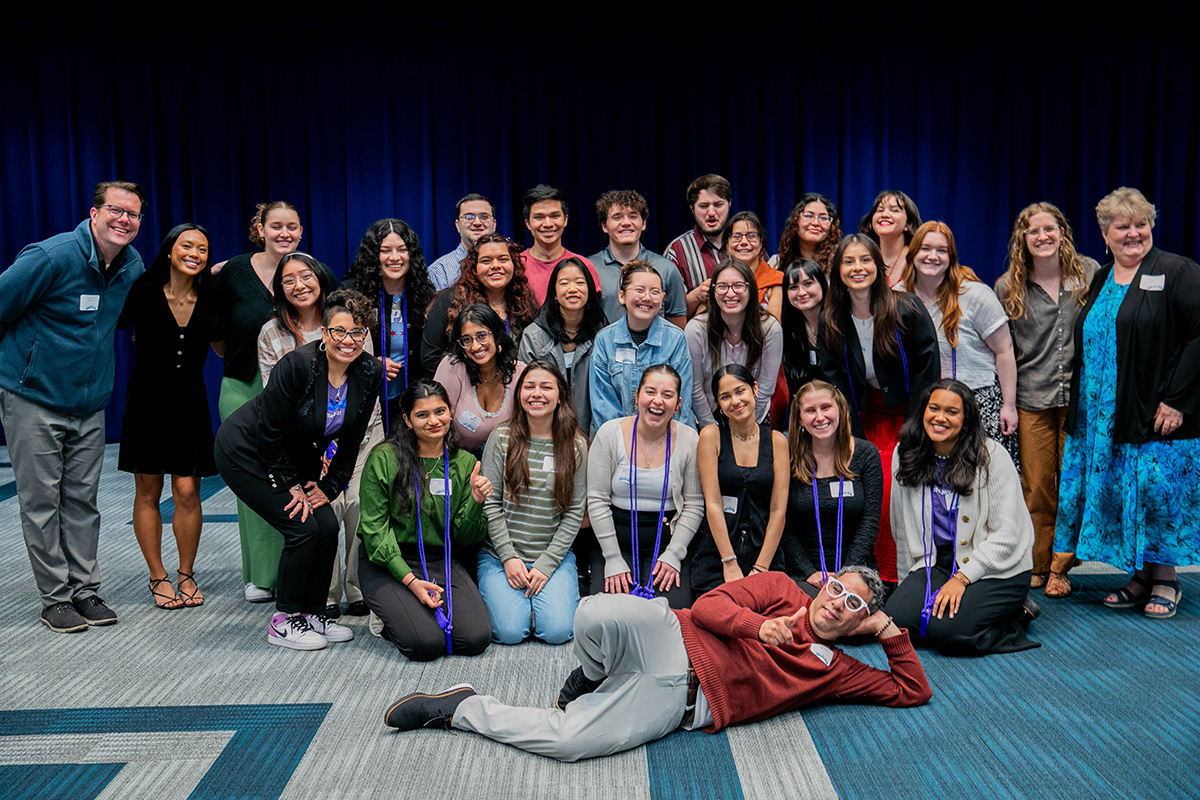
Around 40 DePaul students participated in the Bridgebuilding Fellowship, a program organized by the Division of Mission and Ministry to train students to engage across deep ideological, religious, and cultural differences. The students celebrated the end of their program in May with a dinner and dialogue event. (DePaul University/Lavanya Chetal) Julissa Rios, a Bridgebuilding Fellow and senior studying psychology, says she recently had a conversation with a cousin about their diverging ideas about gender roles in family. Normally, she says those conversations end in shouting or disengaging entirely.
“We’re so set to have our own beliefs,” says Rios. She says her cousin wants to stay home and raise children, something Rios doesn’t see herself doing.
“Sitting in that uncomfortable feeling was better than leaving the conversation and having a rift,” Rios says. “Through the Bridgebuilding training, I learned taking the time to sit down and listen is better for the both of us, and it shows growth.”
Organized by the Division of Mission and Ministry, the fellowship taught 40 DePaul students how to engage across deep ideological, religious, and cultural differences. The quarter-long training was possible thanks to a grant from
Interfaith America , a Chicago-based nonprofit that supports religious diversity and fosters a vibrant pluralism. Fellows learned techniques for active listening, storytelling, and dialogue facilitation.
“These students are determined to relate to another in a way that is open, peaceful and potentially transformative,” says Georgianna Torres Reyes, associate vice president for Mission and Ministry and program leader.
She was moved by the words of Pope Leo XIV, who spoke of a need for dialogue in his first address: “Help us too, then, each other, to build bridges—with dialogue, with encounter—uniting all of us to be one people, always in peace.”
“His words show the urgent need for more people like our Bridgebuilding Fellows who are willing to listen and engage with one another in a world that tells us we are hyperpolarized,” says Torres Reyes, who is also on the Dialogue Collaborative Steering Committee.
 Bridgebuilding fellows facilitated story circles with members of the Dialogue Collaborative at a celebration for their program in May. (DePaul University/Lavanya Chetal)
Bridgebuilding fellows facilitated story circles with members of the Dialogue Collaborative at a celebration for their program in May. (DePaul University/Lavanya Chetal)Emotional connection and storytelling
Bridgebuilding Fellows say the program changed how they approached difficult conversations with people they deeply disagree with, especially those who are close to them. In cases where the conversation may have escalated to a shouting match or shut down the discussion completely, they’re now more comfortable engaging in dialogue to hear and share how they feel.
Vincent Rinella, a junior studying psychology and Bridgebuilding fellow, enjoyed exploring what dialogue means, which he describes as “active, authentic human connection.”
“True dialogue comes when you're actively listening and fully engaged, not just doing whatever is least confrontational or would get you the most time to talk,” Rinella says.
In recent difficult conversations, for example talking about trans rights with relatives, Rinella says he prioritizes listening and trying to understand how they came to their views, rather than correcting or giving facts.
Storytelling, particularly telling personal stories, is a powerful part of dialogue and builds connection between people. Learning to tell captivating stories was one of Rios’ favorite parts of the Bridgebuilding Fellowship curriculum that she has used in many different contexts.
On a service immersion trip this spring to Washington, D.C., Rios sat down with Congressional staff to advocate against cuts in public assistance. She shared how her family, like many working people in her Brighton Park Chicago neighborhood, relied on food, health insurance, and other assistance.
“As I shared my story, I began to cry because of how emotional and personal it was for me, and I noticed the staff member was holding back tears,” Rios says. She introduced the characters in her life story with succinct and powerful descriptors. She told the plot, drawing attention to the tension, and finally, talked about a resolution.
“I knew how to share a captivating story that would resonate with the people shaping policy,” Rios says.
Strengthening a culture of dialogue at DePaul
 Vincent Rinella, a junior studying psychology, facilitated a story circle with participants at the Bridgebuilding Fellows celebration in May. (DePaul University/Lavanya Chetal)
Vincent Rinella, a junior studying psychology, facilitated a story circle with participants at the Bridgebuilding Fellows celebration in May. (DePaul University/Lavanya Chetal)As part of the Bridgebuilding Fellowship, students were asked to host an event that incorporated dialogic practices. Rios shared techniques for active and engaged listening at a recent event she helped plan with the student group First Gen DePaul and the Catholic Student Union. Rinella coordinated a conversation on restorative justice between students in the Community Peacemakers program. Bridgebuilding fellows also facilitated group reflections at a Yom HaShoah (Holocaust Remembrance) Storytelling gathering hosted by the Jewish Life Center in April.
To celebrate the end of this cohort’s work, fellows led intergenerational story circles at a celebration. They shared visions of what dialogue and building bridges across difference looks to them.
“Our student facilitator was exceptional, and the conversation was both thoughtful and illuminating,” says Lexa Murphy, dean of the College of Communication and a founding member of the Dialogue Collaborative. “As I looked around the room, I found myself thinking: Something truly meaningful is happening here.”
The Division of Mission and Ministry and Dialogue Collaborative plan to host the program again next academic year.